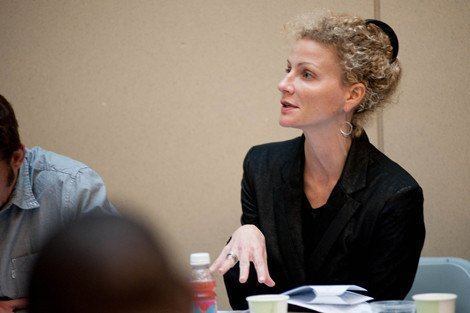October 3, 2013 — It is not just that there is a need for improved access to both health and justice systems, Harvard School of Public Health Lecturer Alicia Ely Yamin told a group of students gathered for a weeklong intensive course on health rights litigation, many people around the world — particularly women — don’t see themselves as having a right to health. This is evident in many hospitals in the developing world where the maternity wards have a “distinctly veterinary quality,” she said. “Imagine how different the picture would be if these women saw themselves as being able to claim health rights and complain when they don’t get them.”
Now in its second year, the annual course on health rights litigation is part of the Global School on Socioeconomic Rights and is hosted by the Program on the Health Rights of Women and Children at HSPH’s Francois-Xavier Bagnoud Center for Health and Human Rights (FXB Center). The course, held September 16-20, 2013, drew 44 participants from 24 countries, including lawyers, judges, scholars, and public health professionals. Sessions covered such topics as sexual and reproductive health rights and approaches to health care rationing.
“The courts are increasingly playing a very important role in setting priorities in health systems in a number of countries across the world, and it’s something that’s very under-studied,” said Yamin, who directs the course. “I hope the students come away with the skills to think strategically about how a health rights framework can be applied through the courts to advance social justice.”
The health rights litigation course brings together faculty members from HSPH, Harvard Law School, and universities around the world. This year’s instructors also included practitioners from Human Rights Watch and the Center for Reproductive Rights.
Students in the course learned about recent health rights cases around such issues as abortion in Colombia, water rights in South Africa, the right to food in India, and access to medicines in a number of different countries. Course organizers also built in ample time for the students to learn from each other. Observing the lively conversations occurring during a coffee break, Yamin said, “Just from talking to each other, they’re networking and creating a community of practitioners.”
Catherine Mumma, a Kenyan human rights lawyer, chose to take the course to gain insight into issues she’s grappling with as a member of the commission overseeing implementation of her country’s new constitution — which for the first time includes the right to health.
“I learned that judicial decisions can actually be used to compel the legislature to implement human rights and socioeconomic rights,” said Mumma. “I will definitely share this with the executive branch and the legislature, to help them develop an approach to implementing the right to health before somebody goes to court.”
In conjunction with the course, Health and Human Rights, an online open access journal edited by Paul Farmer, Kolokotrones University Professor of Global Health and Social Medicine, will release a special issue on health rights litigation guest-edited by Yamin next year. Students will have the opportunity to submit papers related to topics addressed during the course.
Photo: Emily Cuccarese
